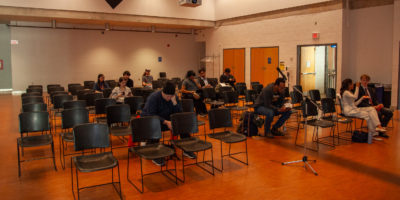By Tom Bartsiokas
Tuition could jump $1,600 a year for Ryerson’s information technology management students if the school adopts a proposal to make laptops mandatory.
Ryerson students already have the option to lease laptops, either through the university’s NetReady program or business management’s Link program, but ITM’s proposal would be the first one to make the computers compulsory.
It would also bumpo total student fees to nearly $6,500 per year.
Although ITM director Kenneth Grant said the idea will improve the quality of the school’s curriculum and teaching methods, some students think the 25 per cent tuition hike is too high to absorb.
“What it all comes down to is financially, if you can’t afford it you are not allowed to come,” said ITM course union president Wayne Au Yeung, who is in the third year of the program. “I can justify everything in the laptop program, but I can’t justify the cost.”
The program, which specializes in such things as telecommunications technology and systems analysis, unveiled its “Distributed Learning Environment Proposal” Wednesday. The 49-page report recommends that starting in September, 2001, all full-time students — approximately 440 — should be required to release a laptop.
The $1,600 annual fee would pay for all necessary software, technical support, a warranty, insurance, a proposed upgrade/replacement after two years and access to the university’s network.
ITM administrators hope to offset some of the cots by offering a bursary to students in financial need. Students will also receive a $400 tax credit, which they wouldn’t get it they purchased the laptop on their own.
“Clearly some students are concerned about the cost,” Grant said. “That’s why we want to make sure we can help.”
Grant said incorporating laptops into the curriculum is an investment that would create a “virtual community” of learning by connecting staff and students.
“We want to make sure everyone know what we’re doing, and why we’re doing it,” he said. “They will graduate with a better knowledge of the tools that they will use in the workplace.”
In a survey conducted by the ITM administrators last year, 300 first-year students were asked how a mandatory laptop program at Ryerson would have affected their decision to come here.
Twenty-five per cent of respondents said they would have been more likely to choose Ryerson, while 18 per cent said they would have been less likely.
Forty-five per cent said it wouldn’t have affected their decisions at all, while the remaining eight per cent didn’t know it if would have.
Despite the survey, Raheel Baig, the course union’s v.p. public affairs and a second-year student, said more students should have been asked about the idea.
“It’s the students that make up ITM,” he said. “Therefore, students should have had more of a say.”
Money isn’t the only issue, said dean of business management Lee Maguire. He helped propose a similar mandatory laptop program for his students, which was to begin in 2001, but its’ not on hold pending review.
Ryerson’s computer systems crash every other day, Maguire said, and there’s not a stable enough system to handle and influx of hundreds of new laptop computers.
“We’re not confident the university has the capability of pulling it off,” he said, adding there has to be some systems in place to distribute and maintain the laptops.
Larry Lemieux, an assistant director in Ryerson’s computing and communications services department, said the university has considered these problems and is in the process of hiring a company to upgrade the school’s network.
Grant said some of those preparations have been made, including training all 20 ITM faculty members over the past 18 months and setting up a help desk to distribute batteries and troubleshoot.
“It’s not like the [ITM proposal] is something brand new that we don’t have issues with,” Lemieux said. “They wouldn’t have forged ahead to implement the program if they hadn’t noticed a large hole.”
The proposal is now in the hands of the Academic Standards Committee, a sub-committee of the university’s academic council. Final approval from that council is the last step needed before the program can take off.
“I will be disappointed if this proposal is not approved,” Grant said. “I absolutely believe this is in the best interest for our students and the school. We want to be Canada’s leading IT business school and that means practising what we preach.”










Leave a Reply